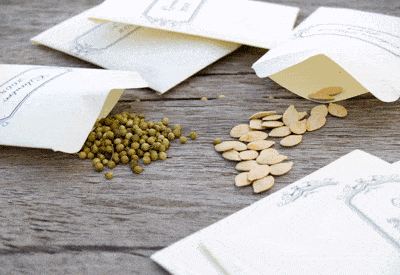As your friendly, memory-challenged Planet Natural Blogger goes through the newly arrived seed catalogs, he marvels at the latest crop (heh) of F1 hybrid seeds to hit garden store racks. Then we start to wonder: what happened to that supposedly high-yielding, easy-to-grow, delicious hybrid tomato or lettuce or squash that was such a sensation back in whatever year it was?
In the catalogs this year, we find a new hybrid tomato with the word “super” in its name, a sweet corn designed to grow in pots, and a spaghetti squash glorified with the name of an ancient Roman city. Will any of them still be around in 10 years? Some, like Burpee’s Early Girl Hybrid have survived the test of time. Others, like the Moreton tomato, celebrated in the mid-Atlantic states for its “Jersey” taste, disappeared when the Harris Seed Company which owned its patent stopped producing it. Luckily, Rutgers University has helped bring it back.

FREE SHIPPING!
Garden Seeds
All heirloom seeds offered by Planet Natural are non-treated and non-GMO.
View allPlanet Natural offers heirloom garden seeds — not the sort you’ll find in box stores — that are non-treated, non-GMO and NOT purchased from Monsanto-owned Seminis. Planting instructions are included with each packet and shipping is FREE! Need advice? Visit our vegetable guides for tips and information on growing specific types.
And that’s the problem — at least one of the problems — with F1 hybrids. Like GMO crops, they are owned by the business that holds their patent. No one else can offer the seed unless they buy the patent or it expires. It’s a great way to corner the market. No wonder new hybrids are advertised with such superlatives.
The other disadvantage, of course, is that they don’t breed true. You can save the seed of a hybrid, if it makes seed, but you won’t get the same plant when you try to grow it the next year. These F1 hybrids can occur naturally when they’re “open pollinated.” Open pollination occurs naturally, by wind, insects, birds or any animal, including humans, carrying pollen between the plants. Hybridization occurs with human help, often to combine specific traits that for one reason or another, are considered desirable such as higher yields, disease resistance or shipping potential. That’s how we got the Tivoli hybrid squash, the first spaghetti-type squash that grows on a bush rather than a vine. Burpee owns the patent on that seed. You can read about the differences between open-pollination and hybridization here.
Many see a problem with corporate interests owning patent on individual seeds. We won’t go into those here. But the solution, in fact often the best seed, is heirloom. Heirloom seeds have been around for generations, passed on from gardener to gardener (of course, they can also be bought from gardening companies). Because of this they not only offer the best flavor, pest resistance and other desirable traits, they encourage community. Seed collection is a wonderful family activity and once initiated makes your garden something of a legacy. Sure, we’ve all grown our share of hybrids and may have tried to develop our own. With heirloom seed, Mother Nature has already done the work for us. In short, heirlooms are tried and true. When planning your garden this winter, try to include planting a little tradition.












